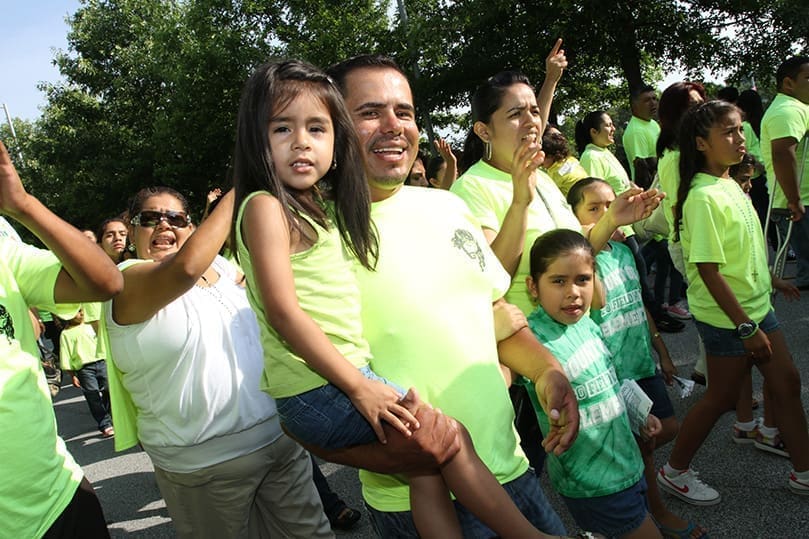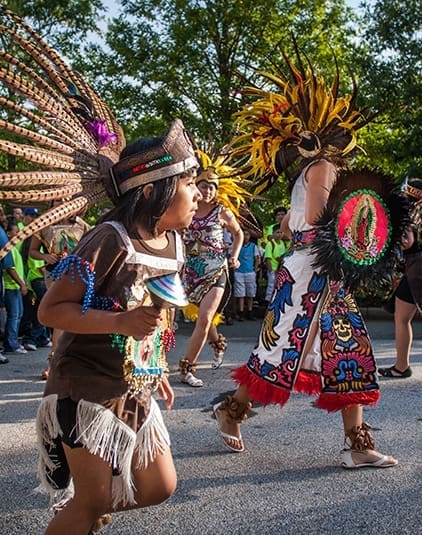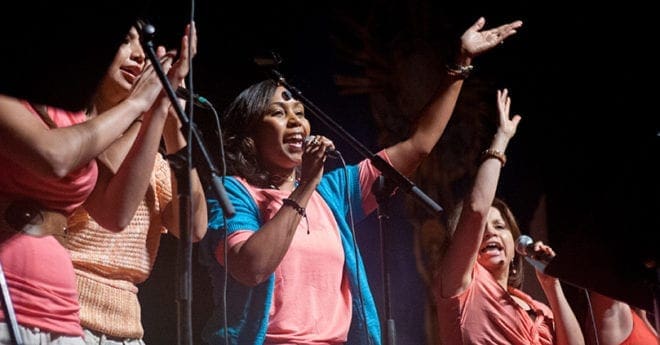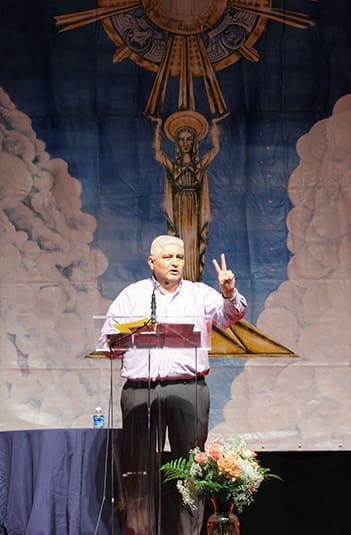 Photo By Michael Alexander
Photo By Michael AlexanderCollege Park
Defending The Faith Is Center Of Hispanic Track
By RUTH E. DÁVILA, Special To The Bulletin | Published June 21, 2012
A Latino choir from St. John Neumann in Lilburn pulsed out energetic Catholic music with a tropical twist. More than half a dozen singers jumped in unison on stage, waving their hands, accompanied by guitarists and a variety of drums. It was the finale of the Eucharistic Congress’s Hispanic track—the largest track of the event, as Archbishop Wilton D. Gregory had noted during a warm welcome speech entirely in Spanish.
In the audience, Dora Portillo, a middle-aged woman with wavy brown hair, smiled serenely toward the choir, as though in praise.
“Some people say that we’re crazy for being Catholic,” Portillo said. “But I say there are a whole lot of crazy people in the Catholic faith, then—and I am convinced that God is truly present here in the Eucharist.”
As a convert, Portillo’s statement is doubly profound. Having been raised in an Evangelical family in El Salvador, a country with strong Protestant ties, Portillo’s conversion went against the grain. Inspired by her Catholic husband—and after much study and reflection—Portillo joined the church six years ago.

Seven-year-old Jessica Eriquec dances with the other liturgical dancers from St. Matthew’s Church, Winder. Photo by Thomas Spink/Archdiocese of Atlanta
“Every time I take Communion, I feel my faith in that moment, and that God is with me,” she said.
With a growing influence from U.S. missionaries, Protestantism is on the rise in Latin America, a region that was traditionally known as a stronghold for Roman Catholicism. In some countries, particularly in Central America, Protestants make up nearly 40 percent of the population, according to a 2007 Gallup poll.
In this context, the congress’s theme of “We Though Many Are One Body in Christ” was decidedly relevant. Being a light in a world of unbelievers is challenging, not to mention when navigating relations with people from a myriad of Christian denominations. What should one do when being Catholic isn’t popular?
Martin Zavala, a lay missionary who lives in Arizona, tackled this issue head on. An expert in apologetics, with a host of books and recordings to his name, Zavala instructs Catholics on how to defend their faith, as summarized on his website, DefiendeTuFe.com.
In a humorous and well-received analogy, Zavala urged attendees to consider the church like a wife. Just as a good man is faithful to his wife, he said, people must remain faithful to the church—no matter the circumstances. Offenses committed by church leaders are a sign of human frailty, Zavala said, rather than a reason to depart from a sacred union.
Zavala prodded the men in the audience on responding to the remote possibility that a woman exists who is more attractive than their own wives. The answer, he said, might be yes. But that doesn’t give one license to stray from marriage.
Likewise, some other congregations might be more appealing, he added; they might have more interesting sermons, a more welcoming community or livelier music. However, if one’s faith is unshakable, one won’t be easily swayed when the “men in neckties” come knocking, he said—referring to Jehovah’s Witnesses, a sect he was involved with formerly. (The Jehovah’s Witnesses actively recruit across Latin America and within Hispanic neighborhoods in the United States.)
Zavala asked for a show of hands of people with a family member or friend who have left the Catholic Church to become Protestant. Hands rose from virtually every row of the packed auditorium, accompanied by gasps as people looked around and realized the prevalence of the phenomenon.
The single strongest defense when a Protestant tries to detract a Catholic from his or her faith, Zavala said, is a lesson in history. He reminded them that Jesus founded the church 2,000 years ago as the first Christian Church, whereas some sects whose members attempt to convert Catholics were founded as recently as the 19th or 20th century. Knowing biblical references in favor of the sacraments, to counter the Protestants’ Bible-based arguments against Catholicism, goes a long way, too, Zavala added.
Raul Mendez, a 19-year-old college student, said that within his social circle he is frequently questioned about his faith. “I have some friends who ask stuff like, ‘Why do you go to confession?’ and ‘Why do you worship the Virgin Mary?’” California-born Mendez said.
In fact, he said, his friends most frequently ask about the role of Mary. “I keep telling them we don’t worship her, but we respect her because she gave birth to Jesus and she raised him as her son. She was by his side when he was crucified. And that took a lot.”
Fighting against the undercurrent of Protestantism isn’t the only challenge, as speakers saw it. Within the Catholic Church itself, the faithful should seek renewed reverence for the sacraments.

Spanish track musicians keep the crowd energized during the Eucharistic Congress, June 9. Photo by Thomas Spink/Archdiocese of Atlanta
Msgr. Wilfredo Peña Moredo, a Cuban who has lived in Puerto Rico since the 1970s, gave a lively presentation about the importance of the Mass. He pointed out that Catholics should respect the Mass. Many go to Mass on Saturdays to “get it over with,” he said, but then they spend Sunday—the Sabbath—washing their cars or “going shopping to buy things that they don’t need.”
Mass is about community and worship, Msgr. Peña Moredo said, and is a celebration. He shared a story of a woman whose life was saved when she attended Mass. She had been on the brink of suicide one day and was planning to jump off a bridge in San Juan. Before making the leap, she stepped into Msgr. Peña Moredo’s parish. She was inspired by the homily and the love of the people; her neighbor reached out and hugged her during the sign of peace. She decided not to take her life, and she found new purpose in her faith.
In addition to fraternal unity, Father Jaime Molina Juarez, of St. Thomas the Apostle Church in Smyrna, said the key importance of the Mass is the Eucharist.
A native of Mexico, the country that was most represented in the Hispanic track—and within Atlanta’s Hispanic population—Father Molina Juarez resonated with the people. He spoke of the lessons he learned about pop culture upon attending a few concerts of Mexican bands at an Atlanta venue.
Father Molina Juarez made comical references to how amenable people are when they go to secular events versus their attitudes in Mass. Concert-goers can spend hours in line patiently, whereas parishioners often complain of crowded quarters or parking issues at church. Further, at concerts, taxis line up by the dozen to accommodate Hispanic fans without cars or driver’s licenses, he said, yet for Mass people complain they have no transportation.
Despite any negative tendencies Hispanics might have collectively, their sense of unity transcends nationality, said Auxiliary Bishop Luis R. Zarama. In a brief but effusive greeting, Bishop Zarama emphasized that Latinos should not feel embarrassment or unworthiness but should embrace a pride for their heritage, which is what makes them unique. And this pride should extend to the heritage of being Catholic. Bishop Zarama was met with a standing ovation that left him speechless and tearful.
The idea of transcending guilt and shame was continued by Juan David Henao Cuartas, a young speaker from Medellin, Colombia. Henao was presented by his mother, Luz Maria Cuartas, administrative vice principal of the Escuela Biblica Yeshua, a scripture school in Colombia.

Martin Zavala, a full-time lay Catholic missionary for 24 years, speaks in the final session of the Spanish Track. Photo By Michael Alexander
Henao spoke of a universal message but evoked a sense of understanding of youth. He discussed the vices and travails that face people today—drugs, alcohol, depression, disordered sexuality. God conquers all, he said; nothing is too immense for God to handle. In an evangelical delivery, Henao said the vast audience at the “Convention Center” was turning the venue into a “Conversion Center.”
Jairo Martinez, archdiocesan Hispanic Ministry director, confirmed that this year the Hispanic track attracted a greater audience than any prior years.
“The greatest fruit is seeing how the community is becoming more and more conscious of the real presence of our Lord Jesus Christ in the Eucharist,” Martinez said. “They don’t want to miss the opportunity to come adore him in company with all their brothers and sisters in the faith. It’s wonderful to see that many people united in the love of Christ.”
In the crowd, following the event, Arturo Lopez pondered on how to take the day’s lessons outside, where they are most needed.
“Here we are all comfortable, in our element,” Lopez said. “There are no problems, we’re all praying and praising God, right? But when I go back to work on Monday, my patience might be stretched to its limit. That’s when I have to say: I received the Eucharist and I received Christ, and I can’t act like this.”
Lopez has worked for the past 10 years in a factory in Dalton with a number of non-Catholics. Over time, he has earned their respect for his religion, allowing him not to work Sundays or holy days such as Good Friday.
As a native of Mexico, Lopez is aware that his culture, as well as his faith, is a testimony for others.
“We’re growing as a group. Anywhere you go these days, Hispanics are there,” Lopez said. “I hope that non-Hispanic Americans can also learn from us, and we can give them a Catholic example.”